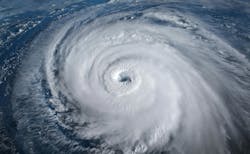Chemical Safety Board Warns of Active Storm Season as Beryl Approaches
The U.S. Chemical Safety and Hazard Investigation Board has a message for processing facilities this summer and fall: Be prepared for an active hurricane season.
The Chemical Safety Board, or CSB, issued the warning days before Hurricane Beryl made landfall as a Category 1 storm near Matagorda, Texas, early Monday morning.
The area is home to several petrochemical and energy companies, which evacuated employees or experienced disruptions due to the storm.
Dow declined to specify if any of its sites were affected but stated it has thorough protocols for severe weather and is responding accordingly. On July 5, Shell said it had “safely paused some of our drilling operations, but there are currently no other impacts on our production across the Gulf of Mexico.”
Exxon Mobil shut in production and evacuated personnel at its Hoover platform in the Gulf of Mexico, the company said on July 7. The company has been communicating with federal, state and local emergency planning officials about measures it's taking to prepare for Beryl, the news release stated.
And Formosa Petrochemicals said in a July 8 update it temporarily shut down operations at its Point Comfort, Texas, plant as a precautionary measure. The Point Comfort site consists of twenty production units that produce a variety of materials including, vinyl chloride, which has become a chemical of concern after the East Palestine, Ohio, train derailment.
"We are actively monitoring the situation and will take all necessary steps to ensure that our
facility is secure and that our team members are safe," the company stated in the news release. Our dedicated crisis management team is working around the clock to assess the impact of the hurricane and to expedite the process of resuming full operations as soon as it is safe to do so."
CSB indicated that process manufacturers along the Gulf Coast could face similar scenarios in the near future. The agency has issued such advisories during past hurricane seasons. But this year is particularly worrisome, the agency noted. Hurricane Beryl has become the earliest Category 5 storm on record in the Atlantic Ocean, the agency noted. This unprecedented early-season intensity may indicate the potential for even more severe storms to develop before the hurricane season ends in November.
In May, NOAA National Weather Service forecasters predicted an 85% chance of an above-normal hurricane season, a 10% chance of a near-normal season and a 5% chance of a below-normal season.
That said, Beryl should serve as a reminder to chemical companies to ensure their facilities can withstand the impact of hurricanes or extreme weather, says CSB Chair Steve Owens.
“This includes having reliable backup generators in case there is a loss of power to a facility,” Owens said.
Emergency preparedness is not only a critical move to ensure operations go on undisrupted and keep employees safe but it’s also a requirement. In March, the The U.S. Environmental Protection Agency (EPA) released new Risk Management Program rules requiring chemical manufacturers to implement extensive safeguards to protect at-risk communities from facility accidents.
The rule emphasizes that facilities must evaluate their vulnerability to natural hazards, such as hurricanes, and ensure that effective strategies are in place to account for extreme weather impacts, including any associated loss of power. The CSB said it supported this requirement during the EPA’s rulemaking process.
About the Author
Jonathan Katz
Executive Editor
Jonathan Katz, executive editor, brings nearly two decades of experience as a B2B journalist to Chemical Processing magazine. He has expertise on a wide range of industrial topics. Jon previously served as the managing editor for IndustryWeek magazine and, most recently, as a freelance writer specializing in content marketing for the manufacturing sector.
His knowledge areas include industrial safety, environmental compliance/sustainability, lean manufacturing/continuous improvement, Industry 4.0/automation and many other topics of interest to the Chemical Processing audience.
When he’s not working, Jon enjoys fishing, hiking and music, including a small but growing vinyl collection.
Jon resides in the Cleveland, Ohio, area.

